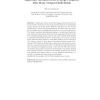Free Online Productivity Tools
i2Speak
i2Symbol
i2OCR
iTex2Img
iWeb2Print
iWeb2Shot
i2Type
iPdf2Split
iPdf2Merge
i2Bopomofo
i2Arabic
i2Style
i2Image
i2PDF
iLatex2Rtf
Sci2ools
224
click to vote
RECOMB
2011
Springer
2011
Springer
Haplotype Reconstruction in Large Pedigrees with Many Untyped Individuals
Abstract. Haplotypes, as they specify the linkage patterns between dispersed genetic variations, provide important information for understanding the genetics of human traits. However haplotypes are not directly available from current genotyping platforms, and hence there are extensive investigations of computational methods to recover such information. Two major computational challenges arising in current family-based disease studies are large family sizes and many ungenotyped family members. Traditional haplotyping methods can neither handle large families nor families with missing members. In this paper, we propose a method which addresses these issues by integrating multiple novel techniques. The method consists of three major components: pairwise identical-bydescent (IBD) inference, global IBD reconstruction and haplotype restoring. By reconstructing the global IBD of a family from pairwise IBD and then restoring the haplotypes based on the inferred IBD, this method can scale to la...
Computational Biology | Computational Challenges | Genetic Variations | Missing Members | RECOMB 2011 |
| Added | 17 Sep 2011 |
| Updated | 17 Sep 2011 |
| Type | Journal |
| Year | 2011 |
| Where | RECOMB |
| Authors | Xin Li, Jing Li |
Comments (0)

